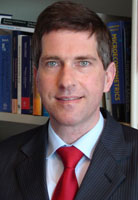Prof. Koning: ‘Don’t expect to make a profit from the Olympic Games’

Minister Maria van der Hoeven of Economic Affairs wants to bring the Olympic Games to the Netherlands in 2028. It will then be exactly 100 years since the Games were last held in our country. Van der Hoeven has commissioned a feasibility study. Ruud Koning, professor of Sports Economics at the University of Groningen, is enthusiastic about the idea. However, he does say that we should not have too many expectations about the economic advantages. ‘We should primarily want to do it because it’s fun.’
Ruud Koning thinks Van der Hoeven is very sensible to first do a feasibility study before we make a bid. ‘If we immediately say that we are going to do it, we’ve already committed ourselves. At a certain point it might turn out that it’s not feasible at all to bring the Games to the Netherlands. That’s why it’s a good idea to investigate the economic aspects first and see if we have the right infrastructure.’
Huge organization
A whole lot would still have to happen before we can bring the Games to the Netherlands. ‘We still have to develop in an organizational sense. Organizing the Olympic Games is rather different to the European or World Skating Championships. The European Football Championships in 2000 went extremely well, so that is a good omen.’ According to Koning, organizing the World Football Championships in 2018 – which the Netherlands is interested in doing – would be the ideal stepping stone. ‘That is the second biggest sporting event in the world. We could learn a lot from it, for example about any potential bottlenecks. And perhaps we’d find out that we wouldn’t be able to cope with anything bigger.’
Huge costs
The costs associated with organizing such a massive event are enormous. Koning: ‘The 2012 Games in London currently have a budget of EUR 13 billion, four times as much as originally thought. That is nearly as much as the entire annual budget of the Ministry of Health, Welfare and Sport. But part of that amount, for certain infrastructure facilities, for example, would have to be spent anyway, so the actual costs would be rather less.’ Koning emphasizes that we should not bring the Games here for their positive economic aspects. ‘That will always be a disappointment. You cannot regard it as a profit-making project. We should primarily want to do it because it’s fun, and we should be prepared to make sacrifices. In the meantime, the Games would put the Netherlands back on the map.’
Support
Koning finds it difficult to estimate whether we’d be in with a chance for the Games in 2028. ‘It’s still so far away. Anything could happen.’ He thinks it’s a good sign that Jacques Rogge, president of the IOC, has warned about the increasing massiveness of the Games and that they will in future only be able to be organized by the larger countries with lots of money. ‘But if we want to be in with a chance, the most important thing is support from the general public. When we tried to bring the Games to Amsterdam in 1992, there was a lot of opposition. Members of the Olympic Committee had cakes thrown at them. It was hardly a surprise that we didn’t make it through the first round. I have a feeling that the support is much wider now.’
Curriculum Vitae
Ruud Koning (1966) studied Econometrics at the University of Groningen. In 1995 he gained his PhD from the same university. Between 1994 and 1998 he was university lecturer at the department of Econometrics of the VU University in Amsterdam. He returned to Groningen in 1998, and became professor of Sports Economics in 2004. His research concentrates mainly on sport, economics and statistics.
Contact: Prof. Ruud Koning
| Last modified: | 31 January 2018 11.51 a.m. |
More news
-
01 April 2025
UGBS Executive MBA best-rated MBA | Dutch Master's Guide 2025
According to the independent Keuzegids Masters 2025, the Executive MBA of the University of Groningen Business School is the best rated MBA in the Netherlands (both part-time and full-time programmes).
-
01 April 2025
Executive Master of M&A and Valuation accredited as joint degree with Vrije Universiteit Amsterdam
Starting 1 September, participants enrolled in the programme will receive a master's degree from both the University of Groningen and Vrije Universiteit Amsterdam upon successful completion.
-
05 March 2025
Women in Science
The UG celebrates International Women’s Day with a special photo series: Women in Science.
